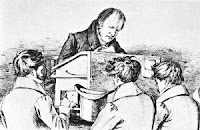The word Universal in itself gives us a hint of being one. 19th century German philosopher G W F Hegel created a conceptual framework in which past and future events could be philosophically understood. Hegel tried to show that history contains a linear pattern and gives it the name of universal history saying history of mankind is one. For this we need to understand the philosophy of history as conceptualized by Hegel, which speaks about a rational process underlying the history. According to him there is a reason / logic behind everything by which all reality has its being. He considers reality as the whole or Absolute and history is in which this absolute unfolds itself to the consciousness of humanity. In the Hegelian system of Universal History, the final stage is constantly evolving.
“Each of the events is a necessary stage in the development of the whole truth. Reason tries to work out through human beings in the form of passion and desires to fulfill its ultimate goal in history.” (Lavine T.Z) Here the ultimate goal in history is linked with the idea of progress.
 The conception of history in form of a linear narrative has been problematic. “The structuring of history according to the linear time frame makes sometimes civilizations to appear and disappear and to move from margin to centre or vice versa according to the identity of viewpoint of the speaker (author).” (Robert S.Nelson) This leads to “marginalization” of most of the developments, which then remain outside the scope of history.
The conception of history in form of a linear narrative has been problematic. “The structuring of history according to the linear time frame makes sometimes civilizations to appear and disappear and to move from margin to centre or vice versa according to the identity of viewpoint of the speaker (author).” (Robert S.Nelson) This leads to “marginalization” of most of the developments, which then remain outside the scope of history.
For understanding the concept of marginalization one can read the article – The Map of Art History by Robert S. Nelson

No comments:
Post a Comment